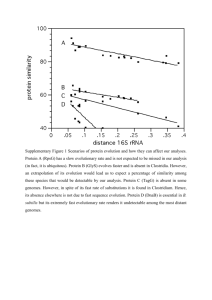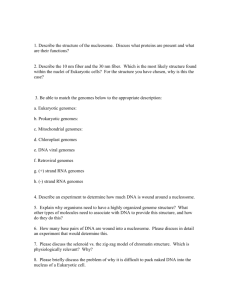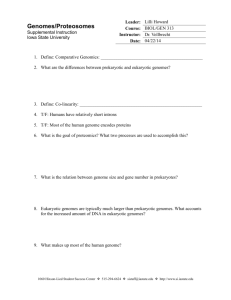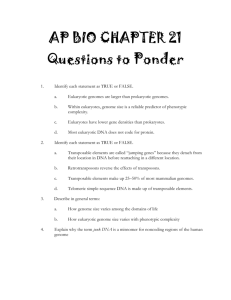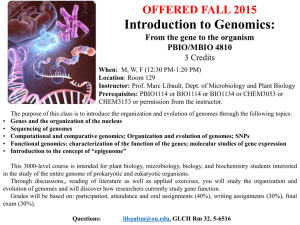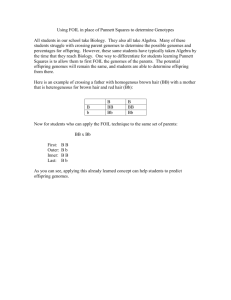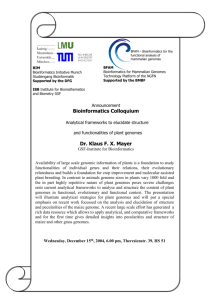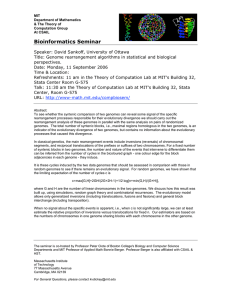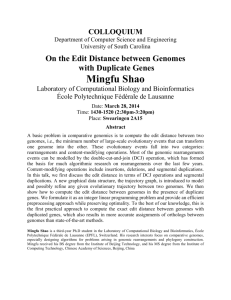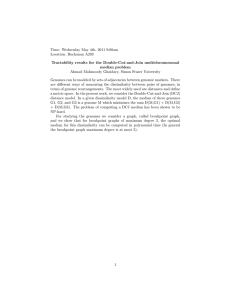Eukaryotic Genes and Genomes MBV4120 Paul Grini & Pål Falnes
advertisement
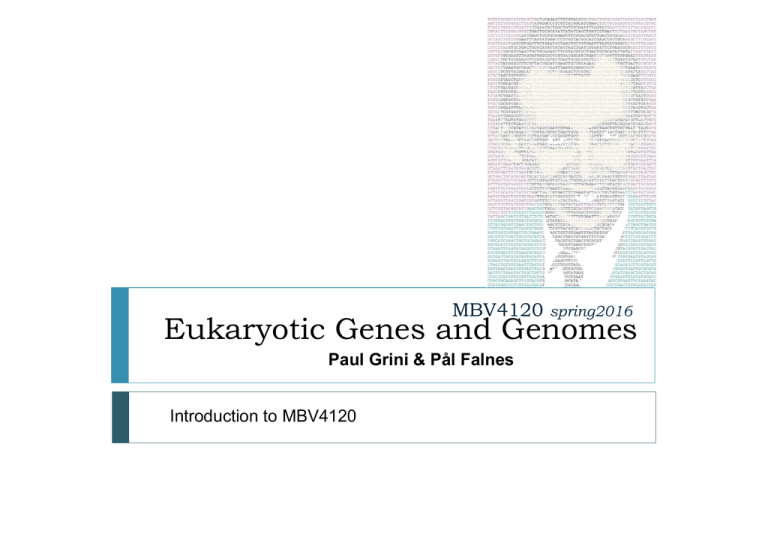
MBV4120 spring2016 Eukaryotic Genes and Genomes Paul Grini & Pål Falnes Introduction to MBV4120 MBV4120 is given in English MBV4120 is based on the use of } http://fronter.uio.no What will you learn? Course content The course gives a comparative introduction on the size, structure and organisation of eukaryotic genes and genomes, and put an emphasis on the functional significance of the organisation and chromatinstructure of genomes What will you learn? ? Genome Size? Protein coding genes? ? What will you learn? What is the content of eukaryote genomes? What will you learn? After completing this course your competence is expected to: ü To be able to give an account for the complexity, size and composition of eukaryotic genomes. ü Knowledge of the content of eukaryotic genomes, such as unique and repeated sequences, mobile elements and coding- and non-coding DNA. ü To know the principles of different levels and types of gene-regulation, and to understand the importance of chromatin modification and small non-coding RNA for epigenetic regulation. ü To be able to give an account for different types of rearrangement and modification of DNA and RNA. ü To know the main principles and mechanisms for genetic manipulation of eukaryotic genomes and to be able to make an account for how genetic methodology in model organisms is used in molecular biology research. Lectures and Topics Lecture I & II Lecture III Lecture IV Lecture V Lecture VI Nuclear Genomes Organelle Genomes Non-coding RNA Transposons and Retrotransposons Reading and Repairing Genomes } Lecture VII Lecture VIII Chromosomes and Nucleosomes Epigenetics } Lecture IX } Lecture X Rearrangement and modification of DNA (General methodology) Rearrangement and modification of DNA (General methodology in model organisms) } } } } } } Lectures and Topics Lecture I & II Lecture III Lecture IV Lecture V Lecture VI Nuclear Genomes Organelle Genomes Non-coding RNA Transposons and Retrotransposons Reading and Repairing Genomes } Lecture VII Lecture VIII Chromosomes and Nucleosomes Epigenetics } Lecture IX } Lecture X Rearrangement and modification of DNA (General methodology) Rearrangement and modification of DNA (General methodology in model organisms) } } } } } } Group-work and oral presentations Text Book and Course Material } Selected chapters from } Lewins “Genes XI” } Selected original articles and reviews } Online databases and tools Colloquia } } } 10 colloquia with group exercises on each topic Group exercises found on fronter Compulsory and additional articles } } } One or two compulsory articles Supplementary articles: Ideally, the group covers all articles Oral presentations of group-work } Topic: Model organisms in genome research, methodology for genetic manipulation of their genomes - possibilities and restrictions. Teaching plan The first lecture starts 09:15 and end at latest 12:00. All other lectures start at 09:15 and end 11:00 All colloquia start at 09:15 and end at 12:00 Teaching plan Teaching plan Teaching plan Teaching plan Teaching plan Where you get information } http://fronter.uio.no Where you get information } http://fronter.uio.no Contact information Room 3223 Contact information Room 3223 Suggestion Colloquia Groups Group1 Group2 Group3 Group4 If you for whatever reason wants to change within the groups: 1. Find an exchange partner 2. Notify the course responsible. Group5 Group6 1 2 3 4 5 6 7 8 9 10 11 12 13 14 15 16 17 18 Anker, Agos.ni, Bakh., Bissenova, Couso, Dejolli, Dybdal, Engh, Eriksen, Ghimire, Gjølberg, Grønsberg, Haaland, Hauge, Haukanes, Heiberg, HuSer, Høyland, Mari Kris.ne Antonio Daniel Samal Rocio Roca Tosca Jan-Morgan Tora Daniela Mina Baarnes Nabin Torleif Tollefsrud Ida AndrieSa Astrid Sissel Benedikte Hallvard Katharina Maren 19 20 21 22 23 24 25 26 27 28 29 30 Ingebrigtsen, Iversen, Kropf Ladegård, Løvestad, Nyhus, Qadri, Reinseth, Stonyte, Vevik, Zuhairi, Öndes, S.an Vegard Correia, Marie Alexander Erik Rojin Ingvild Vilte Eskil Fawzi Nuray Eide Fernanda Kris.ne Yanez Sanderud Sveum Rahmadiyan Break Lecture I starts at 10.30
